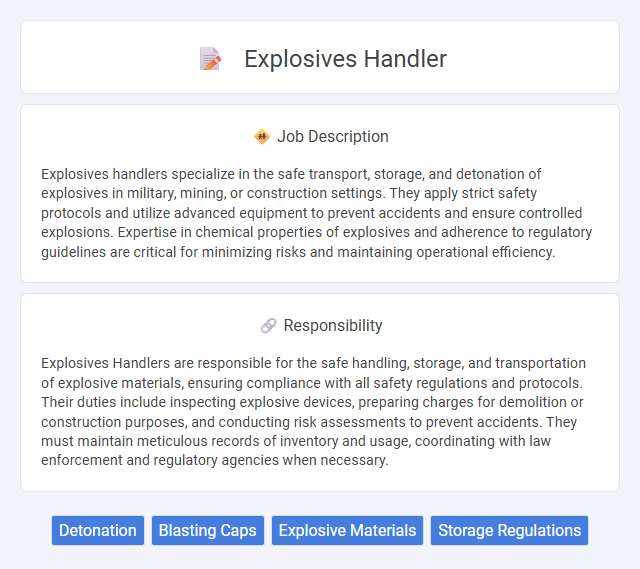
Explosives handlers specialize in the safe transport, storage, and detonation of explosives in military, mining, or construction settings. They apply strict safety protocols and utilize advanced equipment to prevent accidents and ensure controlled explosions. Expertise in chemical properties of explosives and adherence to regulatory guidelines are critical for minimizing risks and maintaining operational efficiency.
Individuals with strong attention to detail, physical fitness, and the ability to remain calm under pressure are more likely to be suitable for an Explosives Handler role. Those prone to anxiety, poor concentration, or physical limitations might struggle to meet the demanding safety and precision standards required. The job probably requires mental resilience and strict adherence to protocols, making it less suitable for people who do not thrive in high-risk, highly regulated environments.
Qualification
Explosives Handlers must possess specialized training in handling, transporting, and disposing of explosive materials safely, typically requiring certification from accredited safety organizations or military training programs. A strong understanding of chemistry, safety protocols, and risk assessment is essential, often supported by a background in engineering, technical courses, or hazardous materials management. Physical fitness, attention to detail, and the ability to operate under high-pressure conditions are critical qualifications to ensure compliance with regulatory standards and prevent accidents.
Responsibility
Explosives Handlers are responsible for the safe handling, storage, and transportation of explosive materials, ensuring compliance with all safety regulations and protocols. Their duties include inspecting explosive devices, preparing charges for demolition or construction purposes, and conducting risk assessments to prevent accidents. They must maintain meticulous records of inventory and usage, coordinating with law enforcement and regulatory agencies when necessary.
Benefit
An explosives handler job likely offers competitive benefits such as comprehensive health insurance, retirement plans, and paid leave due to the hazardous nature of the work. There is probably increased job security and specialized training opportunities that enhance skill development. Employees might also receive hazard pay or bonuses reflecting the risks involved in handling explosives.
Challenge
Explosives handlers likely face significant challenges related to ensuring precise safety protocols while working with highly volatile materials. The job probably demands acute attention to detail and constant vigilance to mitigate the risk of accidental detonations. Handling explosives may involve unpredictable environments, requiring quick decision-making and strict adherence to procedures.
Career Advancement
Explosives Handlers gain expertise in handling, transporting, and disposing of hazardous materials, which opens pathways to supervisory roles such as Safety Coordinator or Ordnance Technician. Advanced certifications in explosive ordnance disposal (EOD) enhance opportunities for specialized positions within military, construction, or demolition sectors. Continuous training in safety protocols and regulatory compliance accelerates career progression toward managerial and consulting roles in explosive risk management.
Key Terms
Detonation
Explosives handlers specialize in the safe preparation, placement, and controlled detonation of explosive materials for construction, mining, or demolition purposes. Mastery of detonation techniques ensures precise timing and minimization of risks associated with blast impact and shockwaves. Advanced knowledge of explosive chemistry and detonation control technology is critical for optimizing blast effectiveness while maintaining strict safety protocols.
Blasting Caps
Explosives Handlers specializing in blasting caps are responsible for the safe handling, storage, and deployment of these sensitive initiating devices in controlled detonations. Proficiency in managing blasting caps ensures precise timing and effectiveness in mining, construction, and demolition operations while minimizing risk. Compliance with stringent safety protocols and regulations regarding blasting cap transport and use is critical to prevent accidental ignition and ensure operational success.
Explosive Materials
Explosives handlers specialize in the safe storage, transportation, and detonation of explosive materials such as TNT, dynamite, and ammonium nitrate. They rigorously follow safety protocols and use specialized equipment to minimize risks associated with handling highly sensitive explosive compounds. Expertise in chemical properties, blast mechanics, and regulatory compliance is essential for managing explosive materials effectively.
Storage Regulations
Explosives handlers must adhere to strict storage regulations to ensure safety and compliance with federal and state laws, including guidelines set by the Occupational Safety and Health Administration (OSHA) and the Bureau of Alcohol, Tobacco, Firearms and Explosives (ATF). These regulations mandate secure, climate-controlled storage facilities with limited access, proper ventilation, and appropriate signage to prevent unauthorized entry and reduce the risk of accidental detonation. Regular inspections and detailed record-keeping are essential to maintain accountability and minimize hazards in explosive materials storage.
 kuljobs.com
kuljobs.com